This year’s theme is:
Planet vs Plastic; 60% reduction in production by 2040
Plastic surrounds us everywhere, from the clothes we wear, to the food we eat and the toiletries and cleaning products in our homes.
Only 9% of plastic is recycled globally, with 71% ending up in landfill or nature and the rest being incinerated or mismanaged.
Plastics originate mainly from fossil fuels and the production, use and disposal of plastic is expected to account for 19% of the global greenhouse gas emissions by 2040.
Greenhouse gases such as Carbon Dioxide and Methane are causing Climate Change which has a detrimental effect on health creating more demand for healthcare services.
“The Climate Emergency is a Health Emergency”
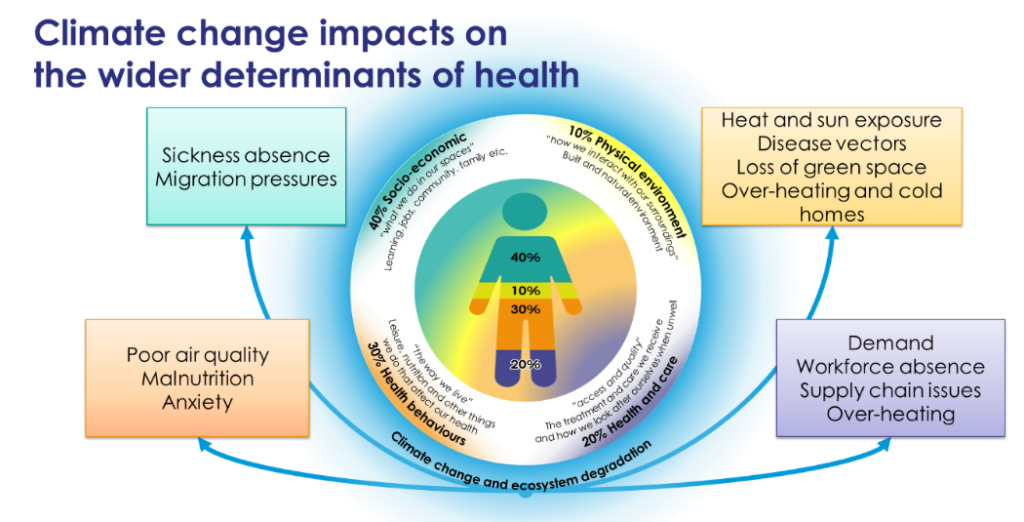
The NHS has declared the Climate Emergency a Health Emergency, and set a target to be Net Zero for Carbon Emissions by 2045; reducing use of plastics is one of the main areas of work.
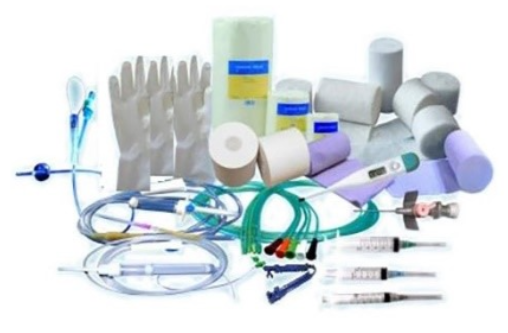
The NHS is a huge consumer of plastics especially single use items such as gloves, cannulas, PPE, syringes, continence pads and IV systems. 1.4% of NHS Supply Chain emissions are due to single use plastic alone.
-
What are the links between Plastics and Health?
What are the links between Plastics and Health?
Micro plastics (tiny pieces of plastic resulting from the breakdown of larger plastics) have now been found in the food chain, human breast milk and the placenta and there is growing evidence linking microplastics and the chemicals they contain to increased risk of:
- Cancer
- ADHD
- Autism
- Diabetes
- Inflammatory Bowel Disease
- Miscarriage
- Male infertility
- Cardiovascular Disease and Stroke
The associated health risks are recognised as higher for children and women and may impact on generations to come.
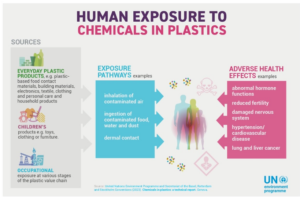
Increased health risks lead to increased demand for healthcare services which are already struggling to provide safe and good quality services. Will the NHS be able to cope?
-
What is the NHS doing to reduce its Plastic use?
What is the NHS doing to reduce its Plastic use?
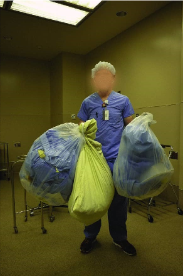
The NHS is working hard both internally and with its supply chain to reduce the use of single use plastics by increasing use of reusable plastics, changing from plastic to more sustainable materials and increasing recycling of single use items.
In October 2023 the use of single use plastics in catering consumables such as cutlery, plates and polystyrene trays was banned in the NHS.
Not only does this reduce the carbon footprint of the NHS but could also save it thousands of pounds each year.
The following 6 product categories account for over 60% of the total plastics used in healthcare globally:
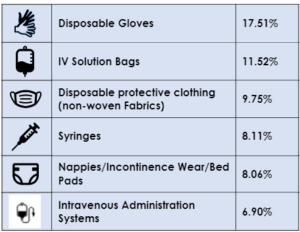
Single use Plastics are an area where the “3Rs” of sustainability can be used effectively in healthcare, with reducing use having the fastest effect:
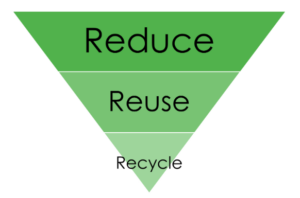
-
Gloves
Gloves
 Before COVID-19, the NHS used 1.4 BILLION gloves each year, this rose by 200% during the pandemic
Before COVID-19, the NHS used 1.4 BILLION gloves each year, this rose by 200% during the pandemicAlthough essential in healthcare, non-sterile gloves are often used unnecessarily and hand hygiene is neglected, increasing the risk of cross-contamination. Addressing the overuse of gloves is a great opportunity for reducing plastic consumption and waste.
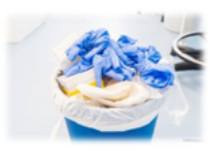
NHSE Launched the “Gloves off” campaign in 2018 and the RCN reinvigorated the campaign in 2022.
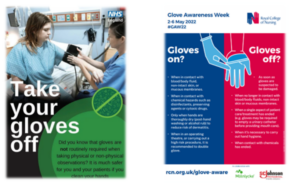
Great Ormond Street saved “3 Tyrannasaurus Rexes” worth of plastics (21 Tonnes) in 10 months by reducing use of non-sterile gloves by 34% (3.7 million gloves), also saving £90k.
-
What’s happening across BLMK?
What’s happening across BLMK?
Milton keynes University Hospital
Use of SharpSmart has prevented 18.2 tonnes of single use products from being manufactured which has reduced emissions equivalent to a London Bus travelling 42,000 miles

 Most specialities now using washable theatre gowns and hats
Most specialities now using washable theatre gowns and hatsCommitted to implementing “Gloves off” and reducing use of non-sterile gloves

 Committed to stop procurement of single use plastic items in catering services
Committed to stop procurement of single use plastic items in catering servicesBedfordshire Hospitals
Use of SharpSmart has prevented 10.2 tonnes of single use products from being incinerated at Bedford Hospital which has reduced emissions by 58 tonnes CO2 per year. This will now be rolled out at the L&D Site

 Committed to stop procurement of single use plastic items in catering services
Committed to stop procurement of single use plastic items in catering servicesCommitted to implementing “Gloves off” and reducing use of non-sterile gloves

BLMK Primary Care Teams
 Encouraging patients to return pill packaging to Superdrug and Boots for recycling
Encouraging patients to return pill packaging to Superdrug and Boots for recyclingEncouraging patients to return inhalers to pharmacies for disposal

 Carrying out reviews of inhaler prescribing to lower carbon alternatives and improving patient inhaler technique to reduce the amount of prescribing.
Carrying out reviews of inhaler prescribing to lower carbon alternatives and improving patient inhaler technique to reduce the amount of prescribing. -
What’s happening elsewhere?
What’s happening elsewhere?
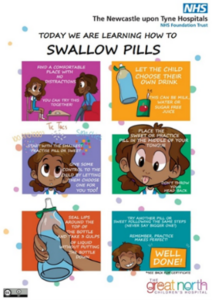
Replacing liquid medicines with pills - Teaching children to safely swallow tablets rather than liquid medicines reduces the use of single use plastic syringes, bottles and lids
(remember to consult your health professional beforehand)Cannulas - Charing Cross Hospital saved 19 tonnes of plastics and £95k by reducing unnecessary cannulation of patients in A&E by 25%
Sharps Bins - Surrey and Sussex Healthcare NHS Trust saved 15 Tonnes of plastics by switching to reusable Sharps Bins
Suture Kits - Royal Sussex County Hospital is expecting to save 2,240 single use suture kits from incineration each by replacing them with reusable instruments with a lifespan of 15 years
Vaginal Speculums- Royal Sussex County Hospital is also increasing the use of reusable metal speculums in its Sexual Health clinics
Blood samples – Black Country Pathology Services is expecting to save 44.6 tonnes of plastic each year and improve efficiency of the service by changing from Plastic bags for blood samples to a tube racking system which has worked well in a Primary Care trial
-
But what can I do?
But what can I do?
Have a look around you - at home, out and about and in the office - how many single use plastic items can you see?
- What are you drinking from?
- What are you wearing?
- What are you eating and how?
- How are your toiletries and makeup packaged?
- How are you cleaning your house?
- Which feminine products do you use?
- What type of nappies do you use?
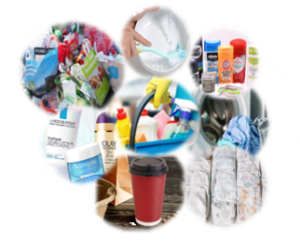
It’s only when you start looking that you see: plastic is everywhere. And you can do something about it.

To find out how you can reduce your use of plastics, click here
Are you on social media?
Take the Earthday Plastic Detox challenge and join the EARTHDAY.ORG #PlasticDetox community!
Want to learn more about Climate Change, Plastics and Healthcare, click here

